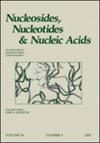核苷和核酸的赝旋相角P与δH扭角(H4′-C4′-C3′-H3′)呈正相关。
IF 1.3
4区 生物学
Q4 BIOCHEMISTRY & MOLECULAR BIOLOGY
引用次数: 0
摘要
DNA双链(A-, B-和Z-DNA)的结构检测表明,伪旋转相位角P与扭转角δH (H4'- c4 '- c3 '- h3 ')呈正相关。这样的P - δH图反映了三种DNA双链的结构特征。由于δH扭转角可以通过核磁共振测量,因此P和δH之间的线性相关性为预测核苷和核酸的糖皱性提供了一种有用的方法。本文章由计算机程序翻译,如有差异,请以英文原文为准。
A positive correlation between the pseudorotational phase angle P and the δH torsion angle (H4'-C4'-C3'-H3') in nucleosides and nucleic acids.
Examination of structures of DNA duplexes (A-, B-, and Z-DNA) showed a positive correlation between the pseudorotational phase angle P and the torsion angle δH (H4'-C4'-C3'-H3'). Such a P - δH plot reflects the structural features of the three types of DNA duplexes. Since the δH torsion angle can be measured by nuclear magnetic resonance, the linear correlation between P and δH provides a useful method for predicting the sugar pucker of nucleosides and nucleic acids.
求助全文
通过发布文献求助,成功后即可免费获取论文全文。
去求助
来源期刊

Nucleosides, Nucleotides & Nucleic Acids
生物-生化与分子生物学
CiteScore
2.60
自引率
7.70%
发文量
91
审稿时长
6 months
期刊介绍:
Nucleosides, Nucleotides & Nucleic Acids publishes research articles, short notices, and concise, critical reviews of related topics that focus on the chemistry and biology of nucleosides, nucleotides, and nucleic acids.
Complete with experimental details, this all-inclusive journal emphasizes the synthesis, biological activities, new and improved synthetic methods, and significant observations related to new compounds.
 求助内容:
求助内容: 应助结果提醒方式:
应助结果提醒方式:


